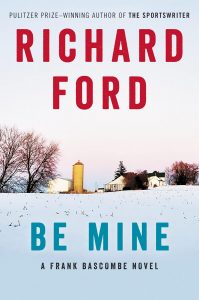My father, who served all of his jokes with a side of corn, would look up from the morning newspaper after reading the obit of some well-known person and lament with mock horror to my mother, “El, people are dying who never died before!”
And therein lies the fundamental flaw with life. No, not Dad Jokes – but dying. Life comes with an expire date. It’s non-renewable. No refills, no second-helpings, no do-overs. Living is, quite literally, a once in a lifetime opportunity.

In “Be Mine,” a father and son share a road trip whose final destination is – ahem – one where every man has gone before. The father is Frank Bascombe, Richard Ford’s Boomer Everyman, who in four previous novels traversed careers and marriages. Now, at age 74, he is behind the wheel of a rented RV chauffeuring his 47-year-old son, Paul, diminished by Lou Gehrig’s disease, across the cold, upper heartland of America.
The father and son are an odd couple. Amid the dissonant commercial clutter of malls and corn-country crossroads, Frank stoically seeks philosophical answers to eternal questions: What is good? (“the absence of bad”); he also longs for the comfort of intimacy, but he looks for love in all the wrong places, including a Vietnamese massage parlor near the Mayo Clinic. Paul, in contrast, is on-the-spectrum manic, grasping at whatever glitters, embracing the ephemera of roadside attractions to compensate for the drip-drip-drip of his coming demise.
Frank and Paul are dying – who isn’t? – but tomorrow’s death does not preclude today’s happiness. As Frank says, “… to go out the door and not bother with being happy is to give life less than its full due. Which, after all, is what we’re here for. To give life its full due, no matter what kind of person we are. Or am I wrong?”
Reviews of “Be Mine” were mixed. “It’s hard to see a better novel being published this year,” said one newspaper critic; the “thinnest and least persuasive of the Bascombe novels,” opined another. I lean more toward the former, in part because I cannot compare this novel sharply enough with “The Sportswriter” and “Independence Day,” which I read years ago, but more so because many of the “chin-stroking proverbs” that Frank utters in a laconic acceptance of our inevitable end seem less like clichés than hard-won truths, loving cups earned during the long game of life.
“Be Mine” is not a perfect book (is there such a thing?), but it is rich with observation and insight whose value is not attenuated by repetition. The experiences of Frank and Paul, some humorous, some sad, some hard, seem, in a word, authentic. Yes, there is some drag at the end, but not enough for me not to recommend it, especially to anyone struggling with the vagaries of aging, be them their own or those of a fellow traveler.
